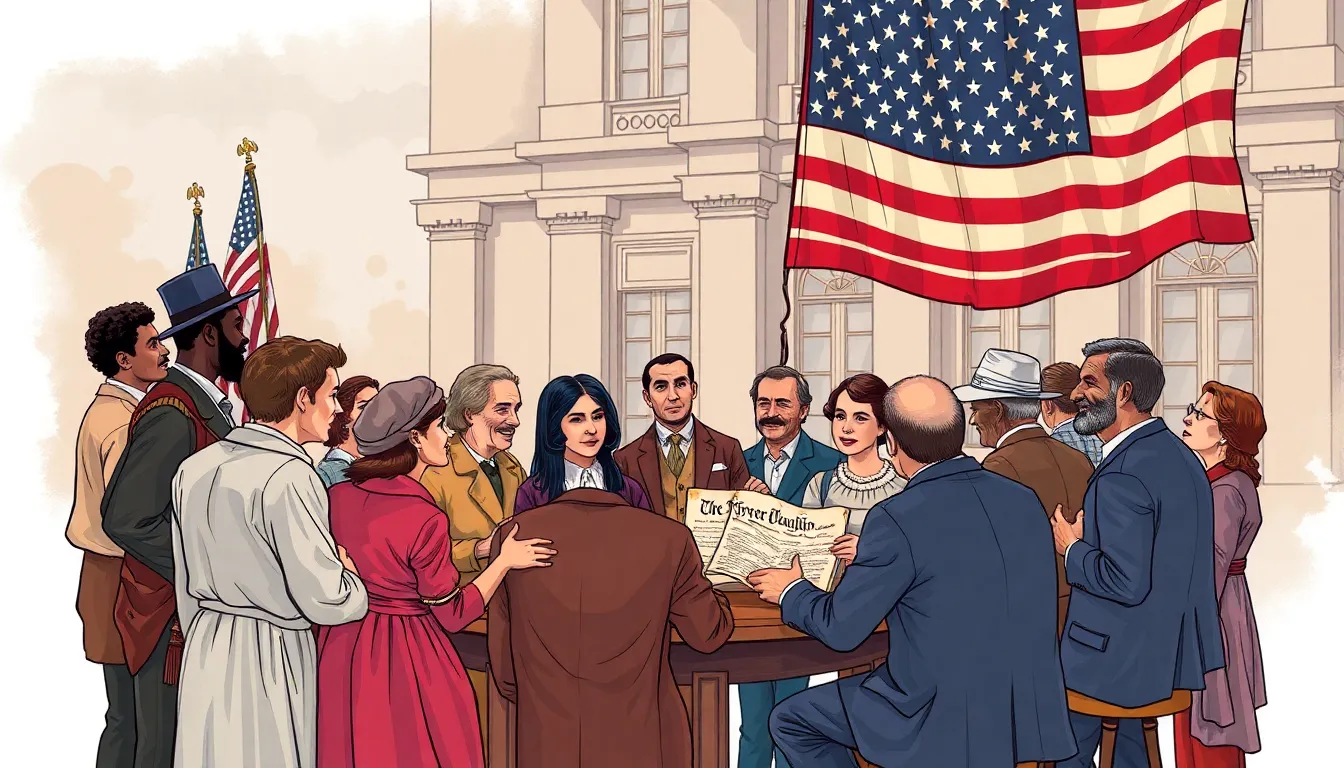Table of Contents
ToggleIn a world where political landscapes shift faster than a cat meme goes viral, political exploration has never been more essential. It’s like navigating a maze where the walls are constantly moving, and the cheese is a hot topic. Whether it’s uncovering the hidden gems of grassroots movements or diving into the depths of party politics, understanding the current climate can feel like deciphering a secret code—one that can unlock the doors to informed decision-making.
But fear not! Political exploration doesn’t have to be a dry, dusty affair. With a dash of humor and a sprinkle of curiosity, it can transform into an engaging journey. So grab your metaphorical compass and join the adventure. Who knows? You might just discover that politics isn’t all doom and gloom; it’s a vibrant tapestry woven from diverse voices and ideas waiting to be explored.
Understanding Political Exploration
Political exploration serves as a crucial aspect of navigating the complexities of contemporary politics. It involves examining various ideologies, movements, and political behaviors in an ever-evolving landscape.
Definition and Overview
Political exploration encompasses the systematic examination of political landscapes, movements, and ideologies. This inquiry aids individuals in grasping the intricacies of governance and civic engagement. It enables participation in political processes, fostering informed citizenry. Through political exploration, one gains insights into grassroots initiatives and established party dynamics. Understanding these elements promotes awareness of how policies affect communities. Engaging with diverse political perspectives enriches one’s comprehension of societal issues, enhancing overall civic responsibility.
Importance in Modern Politics
Political exploration holds significant importance in today’s society. It empowers individuals to challenge norms and contribute to discourse. Awareness of emerging movements allows for informed voting choices and active participation in advocacy. Engaging with varied viewpoints can lead to innovative solutions for pressing issues. An informed populace can better address challenges such as inequality and environmental concerns. Political exploration fosters dialogue that bridges divides, encouraging collaboration across different political ideologies. By understanding the shifts in political sentiment, citizens can proactively influence policy decisions that impact their lives.
Historical Context

Political exploration has deep historical roots, shaped by significant events and evolving ideas over time. Understanding this background enhances awareness of current political dynamics.
Key Events in Political Exploration
Major events have spurred political exploration throughout history. The American Revolution shifted perspectives, emphasizing self-governance and democracy. The Enlightenment introduced philosophical debates that questioned authority and championed individual rights. Additionally, the rise of labor movements in the 19th century highlighted the struggle for workers’ rights, paving the way for contemporary social justice initiatives. Each of these milestones reflects the ongoing quest for knowledge and representation in politics.
Evolution of Political Thought
Political thought has transformed dramatically across centuries. Early thinkers like Machiavelli focused on power dynamics through pragmatism. The Enlightenment era shifted attention to reason and individual freedoms, influencing democratic ideals. In the 20th century, ideologies such as socialism and feminism emerged, advocating for equity and community welfare. Contemporary discussions now integrate post-colonial and environmental perspectives, challenging traditional paradigms. Overall, the evolution of political thought illustrates a rich tapestry of ideas that continue to shape political actions worldwide.
Methods of Political Exploration
Political exploration employs various methods for understanding ideologies and behaviors. These methods typically fall into two categories: qualitative and quantitative approaches.
Qualitative Approaches
Qualitative methods focus on understanding political phenomena through detailed examination. Interviews with activists, surveys of community sentiments, and focus groups reveal insights about grassroots movements. Case studies allow for an in-depth look at specific events or groups, illuminating unique perspectives and diverse narratives. Observational techniques capture political interactions in real-time, providing a rich context for analysis. Each method emphasizes the significance of subjective experiences and cultural contexts in shaping political views.
Quantitative Approaches
Quantitative methods utilize statistical analysis to interpret political data. Surveys generate numerical data from larger populations, facilitating the assessment of trends in public opinion. Polling tools measure voter preferences and behaviors, providing insights into electoral dynamics. Content analysis of political speeches, media coverage, and social media activity reveals patterns in communication styles and thematic focus. This data-driven approach complements qualitative insights, enabling a comprehensive understanding of the political landscape. Each method contributes to uncovering broad trends and correlations within society.
Case Studies in Political Exploration
Political exploration manifests through various real-world case studies that illuminate the complexity of governance and civic engagement. Notable examples demonstrate how grassroots movements and party politics shape societal changes.
Notable Examples
Many significant events exemplify the power of political exploration. The Civil Rights Movement in the United States showcased grassroots activism, leading to landmark legislation that dismantled systemic racism. The Arab Spring unfolded across several Middle Eastern countries, illustrating citizen-led initiatives seeking reform and greater freedoms. Environmental movements, such as Fridays for Future, reflect youth-driven efforts to address climate change and advocate for sustainability. Each instance underscores a unique blend of ideologies and tactical approaches, revealing how people’s voices can influence political narratives.
Lessons Learned
Several lessons emerge from these case studies. Understanding the importance of collaboration among diverse groups fosters stronger community ties. Engaging with varied political perspectives often leads to innovative solutions for pressing issues. Analyzing these historical and contemporary movements highlights the need for adaptability in strategies. Grassroots engagement emphasizes the role of local voices in shaping policy. Lastly, recognizing and addressing socio-economic disparities remains crucial for effective advocacy, promoting inclusivity and equity in political dialogue.
Current Trends in Political Exploration
Political exploration currently incorporates advanced technology and global viewpoints. These trends shape the way individuals engage with and understand politics.
Technology and Political Analysis
Data analytics is revolutionizing political analysis. Analysts leverage big data to glean insights into voter behavior and public sentiment. Social media plays a crucial role, offering real-time feedback on political discourse. Tools like sentiment analysis evaluate public reactions to policies or events. Additionally, machine learning algorithms help predict election outcomes by analyzing past voting patterns. The integration of these technologies fosters a more informed electorate and drives targeted advocacy efforts.
Global Perspectives
Globalization broadens the scope of political exploration. Cross-border movements emphasize the interconnectedness of social issues such as climate change and human rights. Citizens engage more with international political trends, learning from diverse political systems. Comparative politics highlights successful governance strategies worldwide, providing lessons for local adaptation. Understanding international relations also allows citizens to appreciate global policy impacts on local communities. Embracing different political narratives encourages a more holistic view of governance, enhancing civic participation.
Political exploration is more than just an academic pursuit; it’s a vital part of civic engagement. By embracing diverse perspectives and methodologies, individuals can navigate the complexities of governance with confidence. This journey not only enriches personal understanding but also empowers citizens to actively participate in shaping their communities.
As technology and globalization continue to influence political dynamics, the opportunities for exploration expand. Engaging with different ideologies and movements fosters collaboration and innovation in addressing pressing societal issues. Ultimately, political exploration cultivates a more informed and active electorate, capable of driving meaningful change.




